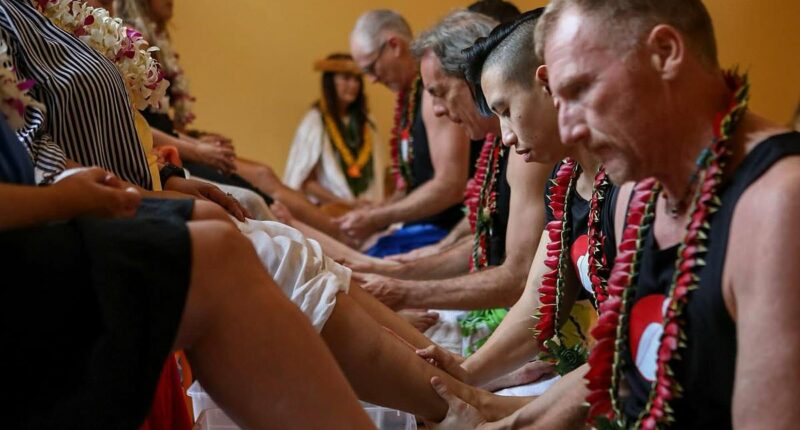Share this @internewscast.com
In the arid expanse of California’s desert, affluent women are shelling out significant sums for a unique experience that involves adorning their private areas with an array of fruits, vegetables, and blossoms.
These participants gather at a retreat nestled within Joshua Tree National Park, where they recline on the earth, either scantily clad or fully nude, while being embellished with cucumber slices, bell peppers, lemon rounds, and rose petals.
This intriguing practice is designed to foster a deeper connection between the women and their bodies at the Back to the Body sexual wellness retreat.
“While the biological clock may have its limits, your sensuality and capacity for arousal are boundless,” explained Pamela Madsen, the event’s host, in an interview with the LA Times.
The attendees, who journeyed from various corners of the United States such as Florida, North Carolina, and Connecticut, represented a diverse range of ages and sexual orientations, spanning from their mid-30s to mid-70s.
As reported by the Times, the retreat aims to assist women in overcoming intimacy challenges, addressing insecurities, processing past traumas, or simply enhancing their sexual experiences.
Some clients were therapists looking to further their own knowledge to help clients in what has been dubbed ‘sexological bodywork,’ a form of body-based sex therapy.
‘I’ve seen women changing, improving their lives,’ Madsen added. ‘They start taking control of their finances, they start to care about how they’re spending their time.’

The retreat in Joshua Tree National Park, California, focuses on helping women overcome possible intimacy issues, insecurities, aid in trauma processing or help to improve their sex lives

Event host, Pamela Madsen, said that their work is an important practice for women looking to claim more autonomy over their bodies
A two-day retreat costs from $550 to $2,000. But Madsen said she urges clients to partake in the week-long retreat, costing from $8,000 to $18,000.
For 2026, she told one group that there were only 30 spots left, and 15 of the 20 women attending signed up with a promised $1,000 discount, the Times reported.
Betsy Crane, a retired professor from Widener University, critiqued that the prices closed off the practice as ‘inaccessible.’
‘I understand why they have to charge as much as they do — it’s staff intensive, they include food, nice venues — but it’s not affordable for most women, that’s the inequality of the world that we live in. If it were more accepted, it could become less expensive because it could be available locally,’ she said.
Madsen said that the prices reflect the market – but the outcomes are worth the cost.
‘Travel is expensive, experiences are expensive,’ she said. ‘What I know is: that I’m not getting wealthy, that it’s hard to keep the ship running. That women get done in a week here what costs them 15 years in talk therapy.’
While the practice was highly revered by those who attended, it has faced mounting criticism – not only for its pricing but also its ethical complications.
UCLA emeritus professor Dr Gail Wyatt, a licensed clinical psychologist and board-certified sex therapist, told the outlet that he doesn’t personally endorse the practice with his own clients.

Some of those who attend are said to be therapists, looking to further their own knowledge to help clients in what has been dubbed ‘sexological bodywork,’ a form of body-based sex therapy
‘I don’t trust [that] the individuals who are assigned [to touch clients] have the boundaries to see this as a professional act and not as an opportunity. Vulnerable individuals may end up in a situation where they’re being taken advantage of.’
While Madsen recognized the worries, she stressed such practices in healing and helping women with their sexuality require physical touch and bodily connectedness.
‘We must touch the body to hear it speak – and that terrifies people,’ she said.
Sexological bodyworkers are also not nationally certified, but do follow a code of ethics upheld by the Association of Certified Sexological Bodyworkers based in Los-Angeles.
According to the association, certified sexological bodyworkers ‘use a client-centered approach to empower, educate, and bring attention to the felt experience through movement, breath, touch, sound, and placement of awareness.’
‘This approach facilitates the ability to change limiting habits, unwind and release what is no longer supportive, re-sensitize the body, and create a more expansive erotic state that integrates both body and mind.’
Madsen also added that the practice in focusing and allowing arousal is not strictly about orgasms or sex but about agency.
‘When women are in touch with their arousal, they start being able to themselves, they start being able to themselves,’ she told the outlet. ‘They find their voice, they’re able to speak their desires.’

One attendee and sex therapist from Connecticut, 39-year-old Mandy Manuel, told the LA Times that the practice has helped her hugely in her own body image and relationships
One attendee and sex therapist from Connecticut, 39-year-old Mandy Manuel, said the practice has helped her hugely in her own body image and relationships.
‘I’ve been in a large body my whole life. And the world will tell you, “You’re not good enough, you’re not pretty enough, you’re not deserving of sex and romance,”‘ Manuel said.
‘I totally bought into that story. And I wanted to challenge that. So I came and it was life-changing. Just recognizing ‘Oh, wow, I can receive”.’
‘My standard for dating shot way up. Previously it was: “I’m just going to accept whoever wants me’ and now it’s ‘who do want?”‘
Madsen said her work is helping women claim more autonomy over their bodies.
‘Women have only had the right to vote for just over 100 years,’ she said. ‘You [often] couldn’t have a checking account or credit card without a man.
‘Why is this work important? Because we’ve been taught not to trust ourselves, not to trust our bodies. That we are vehicles for birth, that we are vehicles for sex, vehicles for entertainment, vehicles for service — we are not sovereign. What does this work do? It creates sovereign women.’

















